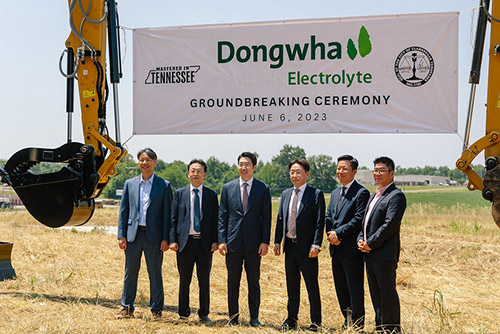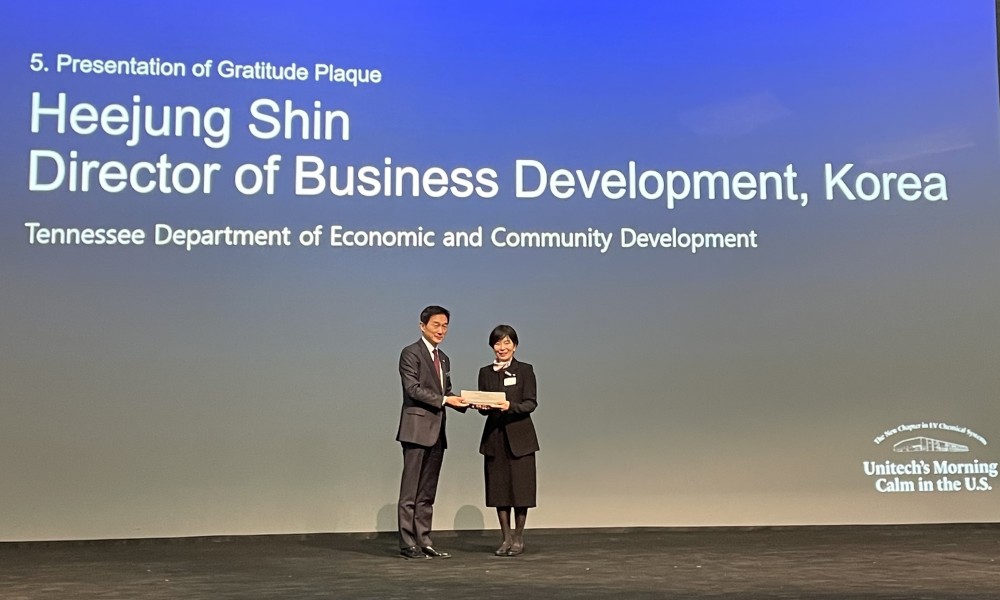Economic development is a competitive venture among states. Not only does it depend on the right combination of site selection factors and incentives, but also sincere, long-term relationship-building with foreign countries. Although this effort may take some time, it builds trust, creates industry momentum, and leads to robust cluster development.
Tennessee continues to score big wins for foreign direct investment (FDI) as a result of its friendly business and tax environment, central location, transportation infrastructure, well-educated workforce, and quality of life. Tennessee is home to nearly 1,050 foreign-based establishments that employ roughly 165,000 people across the state. Much of this growth is due to the Tennessee Department of Economic and Community Development’s (TNECD) well-earned reputation for building relationships, understanding cultures, and solving problems.
“A big part of this success is our group of in-country global FDI directors,” says Karel Abboud, global director of FDI and trade for TNECD. “We have a team of five directors of business development that recruits in 12 countries across Europe and Asia.”
Tennessee is home to nearly 1,050 foreign-based establishments that employ roughly 165,000 people across the state. These trade professionals are a powerful recruitment asset because they live in-country, speak the language, and share the same culture as these foreign companies — all of which provide a sense of trust and comfort for companies that want to set up operations in the U.S., often for the first time. The directors understand their prospective client’s perspective and can address concerns from a common ground that U.S.-based project managers cannot do. As a single reliable point of contact for businesses, Tennessee’s FDI directors are at the forefront of building trust and long-term economic partnerships.
Building the South Korea-Tennessee Partnership
One of Tennessee’s top FDI partners is South Korea. Investment by Korean companies continues to grow — since 2016, TNECD has landed nearly 20 projects by Korean-owned companies to create 4,600 new jobs and invest over $4.9 billion in capital. South Korea ranks among the top 10 countries for FDI in Tennessee, much of which is invested in automotive operations. According to fDi Markets, an online Financial Times product, Tennessee ranks second in the nation for job commitments from Korean companies over the last five years and fifth for capital investment.
Much of the success in building the South Korea-Tennessee relationship is due to TNECD’s in-country FDI representative in South Korea, Heejung Shin. Relationship building is a critical part of business decisions, “especially for Koreans,” says Shin. “Key factors for building a long-term relationship are sincerity, honesty, and consistency. These relationships are not limited to just business associates, but also include lawyers, accountants, architects, and various association members in both South Korea and the U.S.,” Shin explains. “By getting to know professionals in all the different fields that impact a company's expansion, I can show them what Tennessee has to offer and introduce them to the other service providers that can help them be successful in Tennessee.”
South Korea ranks among the top 10 countries for FDI in Tennessee, much of which is invested in automotive operations. When she meets with potential clients, Shin describes the excellent business environment in Tennessee and the continuous support and cooperation from local governments. Even though incentives are important, “what truly matters most to Korean companies is the unwavering support and cooperation on the local level, such as permitting assistance during the construction phase, and then ongoing support after operations commence,” Shin says. “Korean companies venturing into the U.S. need the swift and precise support of local governments to help them navigate the challenges of their new environment. Especially for Koreans, being prompt and responsive are important, and Team Tennessee has proven to be both.”

Industry clusters result from similar companies moving to a region or community — they see the cooperation, support, and even collaboration and want to be part of that synergy. Top-tier suppliers typically locate within the cluster, creating a further sense of community.
Clarksville is a good example of a Tennessee community that has become a thriving manufacturing cluster, anchored by several South Korean companies (Hankook, followed by LG Electronics, Shinhung Global, Hankook & Company, LG Chem, and Dongwha Electrolyte).
After Hankook Tire’s decision to locate in Clarksville in 2013, the company later provided valuable insight and assistance during LG Electronics’ site search in 2015/2016, which led to LGE’s ultimate decision to locate in Clarksville as well. Other Korean automotive suppliers and battery manufacturers have since joined the Clarksville cluster.
“Continuous attention, support, and cooperation from state government and the local community are critical factors in attracting foreign businesses,” says Shin. “This is never achieved in a short time, which is precisely why many Korean companies have chosen to establish themselves in Clarksville — the track record of support, success, and proximity of other Korean companies.”
Shin’s role in facilitating the location of South Korean companies in Tennessee is deeply valued by her clients: “Heejung works in a very agile way when it comes to understanding client inquiries and following up with what's needed promptly, but more importantly, in the right way to add value to the client’s business,” says Wonbae Kim, COO and a senior director of Dongwha Electrolyte. “She puts top priority on the consistency and transparency of her communication with all her clients, who trust her as a long-term business partner."
Clarksville is a good example of a Tennessee community that has become a thriving manufacturing cluster, anchored by several South Korean companies. Trust, Support, and Service
Korean companies have a strong presence in manufacturing sectors such as automotive, electronics, chemicals, electric vehicles (EV), food, and biotechnology. Recent moves into Tennessee by Korean companies include:
- 2022: LG Chem — $3.2 billion cathode materials plant in Montgomery County for EV batteries, 1,000 jobs
- 2023: Dongwha Electrolyte USA — $70 million facility in Clarksville that will produce electrolytes for EV lithium batteries, 68 jobs
- 2023: Enchem America — $152 million for an electrolyte manufacturing plant Brownsville, 190 new jobs
- 2023: Hanon Systems — $170-million manufacturing facility in Loudon that will produce thermal solutions for the EV industry, 600 jobs
- 2024: Unitech North America — $30 million for its first U.S. facility in Morrison, which will produce thermal adhesives and battery compression pads for EV batteries, 75 jobs




